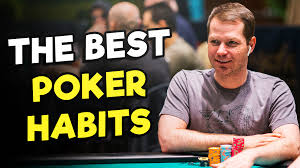
Poker Habits
Imagine a scenario where two players have identical skill levels and knowledge about poker strategies. The player who has cultivated strong poker habits—such as patience, analytical thinking, and emotional control—will likely come out on top when faced with adversity. By focusing on your habits, you’re investing in your potential to win consistently 58winvina.com.
Key Poker Habits for Winning Consistently
To achieve sustained success at the poker table, you need to focus on several key poker habits. These include patience, emotional control, and self-analysis. Each of these habits contributes to a winning formula that allows you to navigate the complexities of the game effectively.
Patience: The foundation of long-term success
Patience is arguably one of the most essential poker habits to develop. The ability to wait for the right opportunities rather than forcing action can drastically improve your results. In a game defined by uncertainty, patience allows you to sift through hands, evaluate situations accurately, and make informed decisions.
When playing poker, you’ll encounter numerous scenarios that test your patience. Whether it’s folding a decent hand pre-flop or waiting for the perfect moment to bluff, your ability to remain composed and focused is paramount. Rushing into decisions often leads to mistakes, which can be costly over time.
Moreover, practicing patience helps you manage your bankroll more effectively. It prevents impulsive decisions that could wipe out your chips in a matter of minutes. A player who exercises patience is more likely to stick around longer, capitalize on opponents’ mistakes, and gradually build their stack.
Emotional control: Keeping your cool under pressure
Emotional control is another cornerstone of effective poker habits. The mental strain associated with high-stakes games can trigger a myriad of feelings such as frustration, excitement, or anxiety. Developing the ability to regulate these emotions will enable you to make rational, calculated decisions regardless of the circumstances surrounding you.
One way to cultivate emotional control is to practice mindfulness. Being aware of your feelings and how they impact your decision-making can prevent you from going on tilt—a state where emotions cloud judgment and lead to reckless play. Recognizing the signs of tilt is crucial; if you find yourself feeling overwhelmed, take a break to reset your mind.
It’s also beneficial to accept that losses are part of the game. Every player experiences downswings, and learning to cope with these setbacks without letting them affect your gameplay is vital. Surrounding yourself with supportive peers or engaging in community discussions can provide encouragement during tough times and help reinforce your emotional resilience.
Analyzing your own play: Constant self-improvement
Self-analysis is a powerful habit amongst successful poker players. Taking the time to review your sessions allows you to identify patterns, discover mistakes, and refine your strategies. The more you analyze your play, the less likely you are to repeat errors.
Creating a habit of reviewing hands can also provide valuable insights into your decision-making process. Utilize tools like hand history reviews or video analysis software to dissect previous sessions. Pay attention to hands where you felt uncertain; understanding why you made specific choices can guide future actions.



